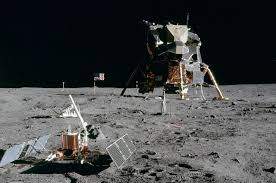New law is first to protect Apollo sites from future moon missions

Preserving the historic sites where humans first landed on the moon is now not only a good idea, it is also the law.
The United States has enacted its first legislation that requires American companies and other entities working with NASA on new missions to the moon to avoid disturbing the U.S. hardware that was left there 50 years ago. The "One Small Step to Protect Human Heritage in Space Act" became law on Thursday (Dec. 31).
"I have long advocated for the preservation of the Apollo artifacts, which hold deep cultural, historical and scientific value for not only the United States, but for all of humanity," Rep. Eddie Bernice Johnson (D-TX), chair of the House Committee on Science, Space and Technology, said in a statement. "It is important that NASA and the United States lead the way in guiding responsible behavior in space, and this legislation to preserve our human heritage in space is, itself, one small step in practicing that leadership."
The new law directs NASA to require future moon missions under its purview to abide by a set of "best practice" recommendations drafted in 2011 "to protect and preserve the historic and scientific value of U.S. government lunar artifacts." The recommendations, which until now have been non-binding, address the paths that spacecraft should follow when descending to the lunar surface and define "keep-out zones" to avoid the purposeful or inadvertent disturbance of the Apollo landing sites. Six missions touched down on the moon between 1969 and 1972.
U.S. commercial enterprises and others seeking contracts, grants or other agreements for lunar activities carried out by, for, or in partnership with NASA will need to agree to stay clear of the human heritage sites on the moon to be eligible for the requested support.
Further, the law requires NASA inform other relevant U.S. federal agencies of the preservation recommendations and encourage their use.
"As we go forward to the moon with the Artemis Program, NASA has been clear that we must do so sustainably," said NASA Administrator Jim Bridenstine. "As part of the Artemis Accords agreements signed with partner nations, NASA has emphasized that protecting historically significant sites is critical, and I applaud the leaders of this legislation for their commitment to ensuring that future lunar science and exploration is done in a safe and transparent manner."
The Artemis Accords, which to date has been agreed to by nine countries — Australia, Canada, Italy, Japan, Luxembourg, Ukraine, United Arab Emirates, United Kingdom and the United States — also includes the preservation of human heritage sites among its ten guiding principles that serve as the framework for international partners to participate in NASA's Artemis program. (Brazil has signed a statement of intent with NASA to become the first South American country to become a party to the accords.)
The One Small Step to Protect Human Heritage in Space Act applies to companies such as Intuitive Machines, Astrobotic and Masten Space Systems, which have contracts under NASA's Commercial Lunar Payload Services initiative to deliver science payloads to the surface of the moon. The law also applies to SpaceX, Blue Origin and Dynetics, which are developing human landing systems for the Artemis program.
"The Apollo landing sites mark one of humanity's greatest achievements: the first time we were able to do more than look up at the sky, but actually leave our planet and visit another world," said Rep. Frank Lucas (R-OK), ranking member of the House Science, Space and Technology Committee. "The One Small Step Act maintains these historic sites while encouraging the spirit of exploration that got us to the moon."
The bill, as first introduced by Senators Gary Peters (D-MI) and Ted Cruz (R-TX) and passed by the Senate in July 2019, applied to all U.S. federal agencies responsible for licensing activities in outer space, not just NASA as enacted. It also only extended protection to Tranquility Base, the Apollo 11 landing site, rather than all six Apollo landing sites, and provided for a penalty fee for violations, which the law as passed omits.The changes to the One Small Step Act were made in a companion bill introduced into the U.S. House of Representatives by Johnson, Lucas, Subcommittee on Space chairwoman Kendra Horn (D-OK) and ranking member Brian Babin (R-TX). The House passed the bill on Dec. 16 and the Senate agreed to the amendments four days later.
The legislation, as enacted, allows the NASA Administrator to waive restrictions on accessing the Apollo landing sites if the reasons for doing so are legitimate and have significant historical, archaeological, anthropological, scientific or engineering value."I saw Apollo bring out the best of America and the best of humanity," said Thomas Stafford, a former NASA astronaut who flew to the moon as commander of Apollo 10. "The efforts of Senators Peters and Cruz and Congressmen Johnson, Lucas, Horn, and Babin will help ensure the achievements of the Apollo program serve as a beacon of inspiration — not just for America but for people all over the world for generations to come."
Photo: Tranquility Base, the Apollo 11 moon landing site, as photographed on July 20, 1969. A new U.S. law protects the site and the other Apollo landing sites from purposeful or inadvertent disturbance 50 years later.(Image: © NASA)
Link: New law is first to protect Apollo sites from future moon missions | Space




